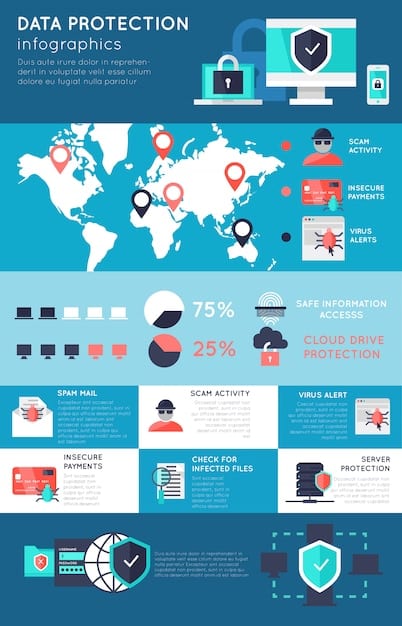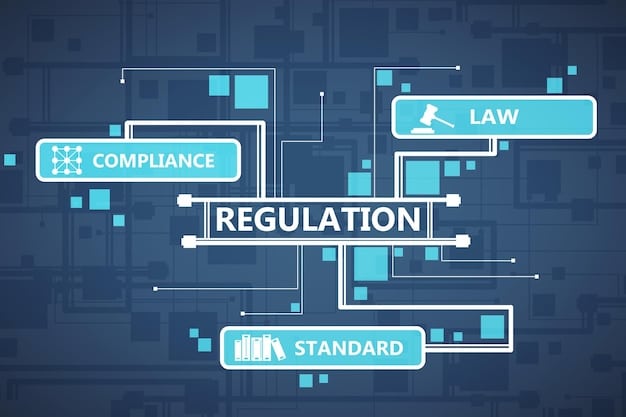Data Privacy Regulations: Your US Legal Obligations & Penalties

Data Privacy Regulations: Understanding Your Obligations Under the Latest US Laws and Avoiding Costly Penalties involves adhering to federal and state laws like CCPA, CPRA, and HIPAA. Compliance helps prevent severe financial penalties and reputational damage, ensuring consumer trust and sustainable business practices in the US market.
Navigating the evolving landscape of Data Privacy Regulations: Understanding Your Obligations Under the Latest US Laws and Avoiding Costly Penalties is crucial for businesses operating in the US. Staying compliant can seem daunting, but disregarding these regulations can lead to significant financial consequences and harm your brand’s reputation.
Understanding the Need for Data Privacy Regulations in the US
Data privacy regulations are becoming increasingly vital in the United States due to the growing concerns over how personal information is collected, used, and shared. These regulations aim to protect individuals’ rights and give them more control over their data.
These regulations address the need for standardized privacy measures that protect personal information. Compliance is essential for maintaining customer trust and avoiding potential legal and financial repercussions.
The Rising Concerns Over Data Misuse
One of the primary drivers behind increasing data privacy regulations is the growing concern over data misuse. Data breaches and unauthorized data usage have become frequent news items, leading to heightened public awareness and demand for stronger data protections.
With more data being collected and processed, the risk of misuse also increases. Strong regulations can mitigate this risk by ensuring data is managed responsibly and transparently.
- Protecting consumer rights is essential.
- Avoiding data breaches reduces financial losses.
- Maintaining business reputation builds long-term value.

Ultimately, the need for data privacy regulations in the US boils down to creating a digital environment built on trust and responsibility. Regulations help manage data risks, safeguarding consumers and ensuring sustainable business practices.
Key Federal Data Privacy Laws in the US
Several key federal data privacy laws set the stage for how organizations must handle data in the United States. Familiarizing yourself with these laws is vital for ensuring compliance and protecting your business.
These laws apply to organizations across various sectors, necessitating careful attention and tailored strategies to meet their specific requirements.
Health Insurance Portability and Accountability Act (HIPAA)
HIPAA is a comprehensive federal law that protects sensitive patient health information from being disclosed without the patient’s consent or knowledge. HIPAA applies to healthcare providers, health plans, and healthcare clearinghouses.
Understanding HIPAA’s scope is crucial for anyone in the healthcare industry; violation can lead to serious penalties and lawsuits.
Children’s Online Privacy Protection Act (COPPA)
COPPA is a United States federal law that imposes certain requirements on operators of websites or online services directed to children under 13 years of age regarding their online collection, use, and disclosure of personal information.
COPPA requires websites and online services to obtain verifiable parental consent before collecting, using, or disclosing any personal information from children.
The Gramm-Leach-Bliley Act (GLBA)
The GLBA requires financial institutions to explain their information-sharing practices to their customers and to safeguard sensitive data. The GLBA applies to banks, insurance companies, and other financial institutions.
Compliance is achieved through three main rules: the Financial Privacy Rule, the Safeguards Rule, and the Pretexting Rule.

Staying compliant with key federal data privacy laws requires constant vigilance, detailed compliance plans, and willingness to adapt to the changing regulatory landscape. Each law serves as a cornerstone in protecting individual privacy rights in the United States.
Understanding State-Level Data Privacy Laws
In addition to federal laws, several states have enacted their own data privacy regulations, which add another layer of complexity to compliance. It’s essential to understand these state-specific laws, as they can have a direct impact on how you conduct your business.
These state laws often grant additional rights to consumers beyond what’s stipulated at the federal level, requiring businesses to stay informed and adaptive.
California Consumer Privacy Act (CCPA)
CCPA is one of the most comprehensive state privacy laws in the US, giving California residents more control over their personal information. CCPA grants consumers the right to know what personal information is collected, to delete their personal information, and to opt-out of the sale of their personal information.
CCPA applies to businesses that collect personal information of California residents and meet certain revenue or data processing thresholds.
California Privacy Rights Act (CPRA)
CPRA amended and expanded upon the CCPA in 2020 and became fully enforceable in 2023. CPRA establishes a new California Privacy Protection Agency (CPPA) responsible for enforcing the law and provides consumers with additional rights, including the right to correct inaccurate personal information and the right to limit the use of sensitive personal information.
The CPRA also extends the reach of the CCPA to cover more types of data and imposes tougher requirements on businesses, helping to further protect consumer privacy.
Other State Privacy Laws
Beyond California, other states have begun enacting their own comprehensive data privacy laws. States like Virginia, Colorado, Utah, and Connecticut have all introduced laws that provide residents with enhanced data protection.
- These laws grant data subjects more rights and controls.
- Compliance needs to be carefully monitored.
- Businesses ought to be adaptive and proactive.
State-level data privacy laws substantially shape the privacy landscape in the United States. Compliance demands an understanding of each law’s specifics as well as the operational agility to implement changes across the organization when necessary.
The Evolving Definition of Personal Information
One of the critical aspects of understanding data privacy regulations is knowing what constitutes personal information. That definition has evolved over time and continues to do so with technology and societal changes.
Recognizing the breadth of what is considered personal information now will reduce ambiguity while meeting requirements.
Traditional Personal Identifiers
Traditionally, personal identifiers have included names, addresses, social security numbers, and other information that could be used to uniquely identify an individual. These identifiers are still central to data privacy laws.
Protecting this information remains fundamental, and almost all data privacy laws focus intensely on ensuring its security and proper handling.
Biometric Data
Biometric data—such as fingerprints, facial recognition data, and voiceprints—is increasingly categorized as personal information. Biometric data offers unique identification but also raises significant privacy concerns because it is nearly impossible to change if compromised.
Given its sensitivity, biometric data is often subject to enhanced protection measures under various data privacy laws.
Understanding and adapting to the evolving definition of personal information is essential for anyone managing data in the US. This knowledge helps businesses to address both legal and ethical aspects of data privacy effectively.
Implementing a Data Privacy Compliance Program
Creating a data privacy compliance program is vital for businesses that want to meet data privacy regulations effectively. This program helps organizations to set up processes for managing, protecting, and processing personal information.
Implementation of successful data privacy programs leads to compliance and fosters a culture of data responsibility.
Conducting a Data Privacy Assessment
The first step in implementing a data privacy compliance program is to conduct a thorough data privacy assessment. This analysis helps you understand what type of personal information your organization collects, where it is stored, and how it is used.
Identifying data flows is key to determining potential risks and areas where improvements are needed.
Developing and Enforcing Data Privacy Policies
After the assessment, your business has to develop clear, actionable data privacy policies that reflect the data privacy regulations affecting your business. These policies should outline how personal information is collected, used, shared, and protected.
Enforcing these policies requires training staff, monitoring compliance, and regularly updating them to address new risks and changes to data privacy laws.
- Regular training for all employees.
- Periodic audits of data practices.
- Secure data collection and storage practices.
Creating and enforcing a data privacy compliance program is an investment in your business’s long-term health. It promotes transparency, accountability, and respect for individuals’ privacy rights.
Common Pitfalls in Data Privacy Compliance and How to Avoid Them
Adhering to data privacy regulations can be tricky, and many businesses make common mistakes that could lead to possible penalties and harm their brand. By being aware of these pitfalls, you and your organization can be proactive and prevent possible missteps.
Avoiding these errors demands persistence and diligence, guaranteeing that data privacy compliance turns into a stable aspect within everyday activities.
Ignoring Data Localization Requirements
One prevalent mistake is overlooking data localization requirements. Some data privacy regulations need personal information to be stored and processed within the country where it was obtained.
Not adhering to these requirements can result in substantial legal penalties and fines.
Failing to Obtain Proper Consent
Obtaining consent is really critical. Businesses have to acquire explicit and unambiguously clear permission before processing personal data. The consent has to be freely given, particular, informed, and unambiguous.
Not taking the consent of data subjects properly may lead to legal cases, fines, and damages to your reputation.
Inadequate Security Practices
Data privacy rules require businesses to implement correct security steps to protect personal data from getting lost, or used in bad ways. Inadequate safety measures can lead to data breaches, presenting risks to consumers.
Using excellent security methods can help your business defend its and its customers assets.
| Key Point | Brief Description |
|---|---|
| 🛡️ HIPAA Compliance | Protects sensitive patient health information from unauthorized disclosure. |
| 🔑 CCPA Rights | Gives California residents control over their data, incl. access and deletion rights. |
| 🔒 Data Security | Implementing security practices is crucial to avoid data breaches. |
| 📝 Compliance Programs | Establish a robust data privacy compliance program to manage and protect personal info. |
Frequently Asked Questions
The main goals are protecting individuals’ personal information, giving them control over their data, and ensuring transparent handling of data by organizations. Regulations also aim to enforce accountability and prevent data misuse.
CCPA applies to businesses that collect personal information of California residents, exceed certain revenue thresholds, or process significant amounts of data. Requirements include allowing consumers to access, delete, and opt-out of the sale of their data.
Businesses must identify if any data localization laws apply to them, store and process data within specified regions, and possibly partner with local data centers. Regular compliance audits are also essential.
Data privacy policies should be reviewed and updated at least annually, or more frequently if there are significant changes in regulations or business practices. Regular reviews ensure ongoing compliance and relevance.
Businesses can provide regular, tailored training sessions, use real-world examples, and test their employees’ knowledge. Incorporating data privacy training into ongoing performance reviews can also help maintain a culture of compliance.
Conclusion
Remaining informed and proactive is crucial in the ever-evolving world of Data Privacy Regulations: Understanding Your Obligations Under the Latest US Laws and Avoiding Costly Penalties. Compliance not only ensures legal safety but also fosters consumer trust and enhances your business’s reputation as a responsible guardian of personal information.





